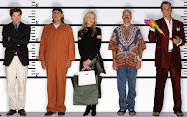 In lieu of writing on last Friday's BSG episode, "Daybreak," I am copying and pasting Alan Sepinwall's breakdown of the BSG/United Nations panel discussion.
In lieu of writing on last Friday's BSG episode, "Daybreak," I am copying and pasting Alan Sepinwall's breakdown of the BSG/United Nations panel discussion.Last night, I had one of the coolest/geekiest experiences of my career, as I got to attend a panel discussion on "Battlestar Galactica" at the United Nations' Economic and Social Council Chamber, featuring Edward James Olmos, Mary McDonnell and producers Ron Moore and David Eick and several UN reps, moderated by Whoopi Goldberg.
Sci Fi Channel went to the trouble of dressing up every seat in the room with placards designating the 12 Colonies. Caprica, naturally, was the primo seating area. I wound up getting a very good view but a very uninspiring colony by sitting in the Leonis section. At first, we wondered if they were maybe pre-existing props from the series (maybe from season one's "Colonial Day"), but the corners weren't cropped, and a friend who used to work on the show pointed out that for that to be true, someone would have needed to know this event would be happening before production wrapped almost a year ago so they could be saved, and that's unlikely. By the end of the evening, a lot of the placards had disappeared into people's bags.
Three things to keep in mind before I get to summarizing the event:
1. The evening was as much about the UN as about "Battlestar Galactica," if not moreso. There were four segments, devoted to issues like human rights, terrorism, and children and armed conflict. After a clip reel illustrating how the series at one point or another tackled that issue, the UN rep gave a long speech discussing the current state of that problem in our world, often making a token attempt at best to connect their subject to the show. Then Whoopi tried her best to balance discussing the issue currently and discussing it in the context of "BSG." Some of the panelists admittedly had never watched the show before they were invited to do the event, and some of the subjects had only a tangential connection at best ("BSG" really only dealt with kids and human trafficking in "Black Market"), and it felt like a lot of the night was an attempt to introduce "BSG" fans to issues that the UN deals with as opposed to introducing the geo-politically-inclined to "BSG."
2. Eddie Olmos likes to talk. The guy's opinionated, and he's passionate, and he'll go on a while. (Whoopi had to cut him off a few times.) But he also has a sense of self-deprecation about it. "You should've never invited me here," he admitted, right before he went on a rant about his hatred of the concept of referring to different ethnic groups as "races." (Said rant climaxed with him leading the crowd in a call-and-response of "So say we all!")
3. Considering 1 & 2, Whoopi did a very good job. Obviously, part of her job on "The View" is to try to maintain control of a chaotic discussion among strong personalities, and she's an unabashed sci-fi fangirl, so she was well-suited to keeping the conversation moving and trying to find a balance between "BSG" talk and UN talk.
 Human Rights
Human RightsWe started off with clips of Kara torturing Leoben in "Flesh and Bone," then The Circle conducting their executions in "Collaborators," and then Lee's speech in "Crossroads, Part 2" about how they've become a gang. Craig Mokhiber, Deputy Director of the New York office of the Office of the High Commissioner for Human Rights, seemed the most plugged-in to the show of all the UN reps, making several references to the show -- "We are all Cylons," he said at one point, while discussing the idea that we dehumanize our enemies to allow ourselves to do horrible things to them, "Every one of us is a Cylon, and every one of us is a Colonial."
Moore and Eick talked a lot about Leoben getting waterboarded, and Eick noted that they went out of their way to make it ambiguous whether he actually had the nuke Kara was looking for, which made it even harder to get on her side as she tortured him.
This segment is when Eddie's rant about race happened, because Mokhiber quoted the founding documents of the human rights office in his speech, and it contained references to different races. When the mic got turned back to Mokhiber a few minutes later, he seemed mortified and went out of his way to explain that the document he was quoting was 60 years old, and featured other outmoded terminology like referring to the two "sexes." And he said he would support any effort to get that language changed.
"When a bug doesn't like you," Eddie said in response to the offer, "that's racism."
"That is so deep, I'm going to take a question (from the audience) now," Whoopie interjected.
There were a few hundred NYC high school students in the crowd, and they were occasionally allowed to ask questions, starting with one about whether our current obsession with technology could lead to the creation of actual Cylons. Moore cleverly brought this back on topic by noting that we're a few years away from actual artificial intelligence, and that there's going to come a point where we have to decide whether to extend human rights to artifical but self-aware creations.
Children and Armed Conflict
Again, this one had very little connection to the show, and the UN rep, Radhika Coomerswamy, admitted she had only watched a couple of episodes to prep for the panel, and was pleasantly surprised to find it was "a deeply moral show" and not just a showcase for special effects.
Whoopi adroitly picked up on some of Coomerswamy's stories about horrific things done to young girls in war-torn countries and used that to spin the discussion around to gender on "Galactica." Moore and Eick talked for a while about how, once they made Starbuck a woman, they decided they wanted her to not be the first female Viper jock, but one of many, in a gender-neutral society, in which all the female officers were called "sir," and in which gender-related epithets were never used. (The closest they came, they admitted, was whenever someone would dismiss Laura Roslin as "a schoolteacher.")
One of the student questions went back to the human rights discussion, asking Mary whether she thought that Roslin was committing crimes when she threw people out of airlocks. Mary said she did, and that it troubled her personally, but that in character, she was absolutely committed to the belief that it was necessary.
"Mary can say she was haunted by airlocking," said Eick, "But she was the one who made it a verb."
Eddie noted that they had deliberately made Laura "the 214th person in line to get this job," and Mary, mock indignant, interrupted to check with Moore that she was, in fact, the 43rd person in line for it.
After another monologue about whether the UN should intercede with the problems in Mexico, Eddie talked about how he as Adama never listened to Roslin on military-related decisions, "And that was a mistake." Moore said they wanted to explore how fragile the law is at times of war, and Eick noted, "You get a brief glimpse into the dynamics of the set when you hear Mary refer to the President as 'Laura,' and Eddie refers to the Admiral as 'I.'"
 Terrorism
TerrorismWhoopi noted that we were running way behind at this point, so the last two segments were briefer than the first two.
The clip reel, not surprisingly, focused on the New Caprica arc and Roslin and Saul Tigh's debate about suicide bombing. Moore said he wanted Tigh to have a strategic rationale for ordering the bombings, that it would be much more frightening if he was logical than if he was crazy.
Reconciliation and Dialogue Among Civilizations and Faiths
There was a lot of talk here about the decision to make the Cylons (the ostensible villains) the monotheists and the humans the polytheists. Moore said it happened almost by accident. He was writing a Caprica Six scene in the miniseries and, on a whim, had her say, "God is love," and a Sci Fi Channel executive liked the line and told him to run with it.
"The network wanted more religious tension," said Eick. "How often do you hear that?"
"Other than on my show," said Whoopi.
They started wrapping up. Moore said that he wanted the show to entertain, but also to make people think -- that even if people came out of episodes like "Flesh and Bone" or "Occupation" with the same beliefs they had when they went in, "at least you thought about it."
Eddie talked about the incredible journey, how they made 84 hours of television. There are some shows or movies that you spend time watching, or working on, where you might regret those lost hours when you're on your deathbed, and he didn't think either those who watched or worked on this show would feel that way.
Mary said she felt "honored to have participated in such profound simplicity," and she and Eddie both expressed their gratitude for being able to participate in an event like this.









.jpg)


No comments:
Post a Comment